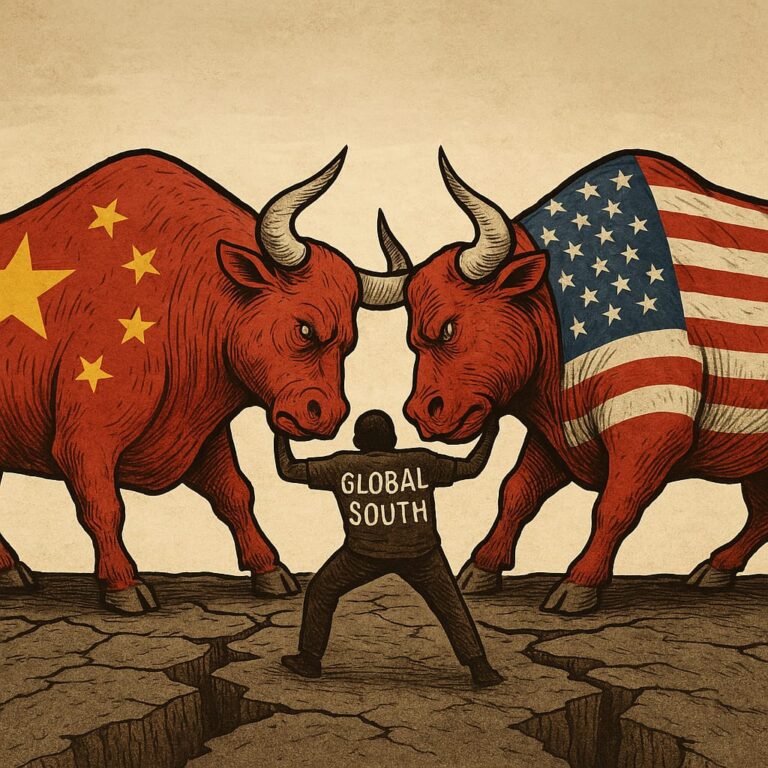
The world’s guardians have gone quiet. The United Nations debates resolutions in echo chambers. The International Court of Justice watches its rulings dissolve into the fog of war. The liberal vision of global governance—a system of laws, alliances, and shared prosperity—is crumbling. In its place, an older logic returns: realism, where power alone dictates survival.
This regression is no accident. For decades, the U.S. anchored the post-Cold War order, enforcing norms and mediating crises. Now, under the mantra of “America First,” it retreats inward, leaving behind a vacuum. Gaza’s streets burn without mediators. Ukraine’s frontlines freeze without peacemakers. India and Pakistan glare across borders without arbiters. Institutions designed to prevent this chaos now mirror it: hollow, gridlocked, and ignored.
The result? A planet fracturing into zones of ungoverned force. Rising powers seize opportunities; weaker states brace for predation. Alliances fray into transactional bargains. And in the shadows of this disorder—from the rubble of Gaza to the nuclear brinkmanship of South Asia—lies a haunting question: When the sheriff leaves town, who answers the call?
The Death of the Liberal Order
How Institutions Failed to Keep the Peace
The post-World War II liberal order was built on optimism and power in equal measure. Institutions like the United Nations, the World Bank, and the International Monetary Fund were designed to channel rivalry into cooperation. American might underwrote it all—militarily, economically, diplomatically. For a time, it worked. Former enemies became allies. Rules restrained ambition. The world, however imperfect, saw fewer interstate wars and rising GDPs—until the cracks emerged.
But it didn’t last.
The first cracks appeared in the rubble of Iraq. In 2003, the United States, bypassing the UN, invaded Baghdad on disputed intelligence. The “coalition of the willing” undermined the very norms it once championed. The message was clear: power can write its own permission slip. The UN Security Council—intended as the world’s moral compass—stood paralyzed. Its authority weakened not by outsiders, but by its most powerful member. Even as institutions faltered, the U.S.—once their chief enforcer—began to step back, prioritizing domestic politics over global policing.
Then came Syria. Bashar al-Assad’s use of chemical weapons, the displacement of millions, and the rise of ISIS played out while the Security Council remained trapped in veto gridlock. Russia and China shielded their ally. The West hesitated. Civilians paid. Once again, institutions meant to prevent horror merely watched it unfold.
Even in areas of global consensus, dysfunction reigned. The Paris Climate Accord—heralded as a landmark in multilateral cooperation—became a symbol of fragility. No enforcement. No consequences. The U.S. entered and exited at will. Other nations followed suit, treating international commitments like talking points, not obligations.
What went wrong?
Part of the failure was overreach. Liberalism tried to become universal—exporting democracy to places unready or unwilling. The wars in Iraq and Afghanistan exposed the limits of “nation-building,” turning global goodwill into cynicism. Liberalism’s overreach created vacuums—spaces where ambition rushed in, unchecked. Meanwhile, revisionist powers—Russia, China, Iran—waited, watched, and offered their own model of order: centralized, authoritarian, and unapologetically realist.
The liberal order, in its ambition, forgot that without enforcement, law becomes theater. Institutions became forums for performance, not problem-solving. Votes were cast knowing they’d be vetoed. Resolutions were passed knowing they’d be ignored. The public spectacle of diplomacy replaced the quiet force of deterrence.
Data drives the point home. Since 2000, over 35 vetoes have paralyzed the UN Security Council—most involving conflicts in the Middle East. Peacekeeping missions operate on shrinking budgets. International law prosecutions languish for years. And in 2023 alone, over 100 countries participated in military exercises outside the UN framework—bypassing collective security altogether.
This is not mere dysfunction; it is collapse by erosion.
The liberal order did not fall in a single moment. It bled out—slowly, visibly, and without a successor waiting in the wings. What remains are relics: a Security Council too divided to act, a World Trade Organization mired in stalemates, and a global commons governed more by inertia than by intent.
And as we turn to the rising conflicts of today—from Gaza’s siege to Ukraine’s warfront—the system’s failure shifts from passive neglect to active accelerant—fueling the very power vacuums it once sought to prevent.
Frontlines of Disorder: Three Warnings from a Leaderless World
Gaza, Ukraine, and the Indo-Pak Brink – Symptoms of a System Unraveling
Gaza: The Vacuum of Justice
Gaza burns, and no one comes. In 2023, Israeli airstrikes leveled entire neighborhoods. Hamas rockets targeted Tel Aviv. Ceasefires brokered by Egypt or Qatar collapsed within days. The pattern repeats: violence escalates, the world condemns, and institutions issue hollow appeals. The UN Security Council? Paralyzed by U.S. vetos shielding Israel and Russian-Chinese indifference.
This is not mere conflict—it is the death of mediation. When the U.S. withdrew from the Iran nuclear deal (JCPOA) in 2018, it abandoned the region’s last binding framework for restraint. Without American pressure, Israel accelerated settlements; without American deterrence, Iran armed proxies. The result? A playground for hardliners. Hamas thrives on desperation. Netanyahu’s coalition clings to power through escalation. Civilians—Palestinian and Israeli—pay in blood.
The Lesson: When great powers vacate the mediator’s chair, the table becomes a battlefield.
Ukraine: The Price of Hesitation
The trenches of Donbas stretch for miles, frozen in time. Ukrainian soldiers ration bullets. Russian drones swarm like locusts. NATO’s promises of support echo, but delivery lags. In 2022, the West rallied: sanctions cratered the ruble, arms flooded in. By 2024? The U.S. Congress stalled $60 billion in aid. Europe debated tank shipments. Putin, sensing hesitation, doubled down.
This is not just a war—it is a stress test for collective security. The Budapest Memorandum (1994) pledged to protect Ukraine in exchange for its nukes. When Russia invaded Crimea in 2014, the West issued statements. When tanks rolled toward Kyiv in 2022, NATO refused a no-fly zone. The message to Moscow was clear: redlines fade when guardians retreat.
The Irony: Ukraine fights not just for its land, but for the very idea that treaties matter.
Indo-Pak: Nuclear Shadows in a Mediator-Less World
Kashmir’s glaciers melt. Its villages bristle with artillery. India deploys troops to Siachen, the world’s highest battlefield. Pakistan tests hypersonic missiles. Meanwhile, the U.S.—once a reluctant referee—focuses on countering China. Beijing steps in, brokering infrastructure deals with Islamabad and provoking New Delhi.
This is not a stalemate—it is a tinderbox without a firebreak. Since the U.S. disengaged from Afghanistan, it has ignored South Asia’s powder keg. India leans into nationalism; Pakistan spirals into economic collapse. China fuels both sides: arming Pakistan with JF-17 jets while buying Russian oil through Indian rupees. The Shanghai Cooperation Organization (SCO) hosts photo ops, not peace talks.
The Stakes: Two nuclear-armed rivals, one contested valley, and zero honest brokers.
The Pattern
Three regions. Three crises. One thread: the absence of custodians.
Gaza lacks enforcers to curb extremism.
Ukraine lacks guarantors to uphold security.
South Asia lacks arbiters to defuse tensions.
The institutions designed for these roles? Spectators. The U.S.—once their backbone—now audits its commitments through the lens of domestic politics. The result is a world where chaos fills voids, and power, not law, dictates terms.
The Sheriff Leaves Town
How ‘America First’ Accelerated the Power Vacuum
The Unipolar Moment’s End
For decades, the U.S. didn’t just lead—it managed. When Slobodan Milošević ethnically cleansed Kosovo in 1999, American jets enforced NATO’s no-fly zone. When Saddam Hussein invaded Kuwait, a U.S.-led coalition rolled tanks into the desert. The world grumbled but acquiesced: America was the reluctant sheriff, flawed but unavoidable.
Then came the unthinkable: the sheriff quit.
The shift began subtly. Under Trump, alliances became transactions. NATO was “obsolete.” South Korea was “free-riding.” Aid came with strings: Pay more. Praise louder. The “America First” doctrine treated global leadership as a burden, not a privilege. Biden promised restoration, but the damage was done. When Russia massed troops on Ukraine’s border in 2021, the U.S. hesitated—debating costs, polling voters, weighing midterms. Deterrence became a spreadsheet exercise.
The Data Doesn’t Lie:
U.S. foreign aid as a % of GDP fell from 0.6% in 1961 (Kennedy’s “bear any burden” era) to under 0.2% in 2023.
Defense spending on European allies dropped by 18% since 2016, even as Russia rearmed.
In 2023, 63% of Americans opposed “prioritizing foreign over domestic issues”—a 30-year high. The unipolar moment didn’t end with a bang. It expired in spreadsheets, polls, and the quiet calculus of retreat.
- The Ripple Effects
When the sheriff leaves town, opportunists loot the streets.
Alliances Fracture:
Saudi Arabia, once reliant on U.S. security guarantees, now brokers détente with Iran—through Beijing, not Washington.
Turkey’s Erdogan—a NATO ally—buys Russian missiles, jails pro-Western journalists, and blackmails Europe with migrant flows.
Quote: “Alliances aren’t marriages; they’re rentals. When the landlord leaves, tenants rewrite the lease.”
Regional Powers Rise (But Can’t Replace):
Iran funds proxies from Yemen to Lebanon, unchecked by a distracted U.S.
India pivots from non-alignment to “multi-alignment,” buying Russian oil while courting Western investment.
China offers “no-strings” loans and security pacts to Global South states—but no peacekeepers, no conflict resolution, no rules.
The Jenga Effect:
Imagine the liberal order as a Jenga tower. For 70 years, the U.S. was the central block—propping up institutions, markets, and norms. Pull it out, and the structure wobbles. Regional powers add their own blocks (Iran’s militias, Turkey’s drones, India’s tariffs), but the tower leans. Then, a gust—Gaza, Ukraine, Taiwan—and the whole game collapses.
The Cost of Retreat
The “America First” era did more than reduce troop deployments—it rewired the world’s expectations.
Adversaries like Russia and China now assume delay from the West. They act fast, bankrolling coups (Sahel), seizing territories (South China Sea), and testing redlines (Taiwan straits).
Allies hedge. South Korea debates nukes. Poland spends 4% of GDP on defense. The EU drafts “strategic autonomy” papers—code for prepare for American abandonment.
Neutrals exploit the vacuum. Brazil’s Lula blames “both sides” in Ukraine. South Africa hosts Russian naval drills.
The sheriff’s absence isn’t neutral. It’s an accelerant.
The New World Disorder
Realism’s Resurgence and the Rules of Jungle Law
The Rise of Realpolitik
The post-war dream of a world governed by norms—human rights, multilateralism, collective security—is being replaced by something older, colder: survivalism.
In this world, power trumps principle. Alliances are transactional. Treaties are optional. Morality is a luxury.
Saudi Arabia, once content under the U.S. nuclear umbrella, now courts enrichment tech—hedging against Iran and American indecision. Russia and Iran, pariahs on paper, trade drones and oil in a new axis of evasion. India, Turkey, Israel—all buy from Russia and partner with the U.S.—because ethics don’t fuel economies. As America’s security guarantees waver, even allies stockpile leverage—not goodwill.
The Numbers Don’t Lie:
Global military spending hit $2.4 trillion in 2024, the highest in human history.
Arms imports to the Middle East surged by 86% since 2016.
In an age of disorder, hard power is the only insurance policy.
Ungoverned Spaces
The new frontier isn’t just land—it’s cyber, shadow wars, and outsourced violence.
There’s no Geneva Convention for hackers. No UN mandate for bot swarms or deepfake coups. In 2023, ransomware attacks surged by 72%, targeting hospitals, pipelines, and democracies—all without consequence.
Wagner Group props up dictators from Mali to Syria. Aegis and other Western mercenaries blur the line between contractor and combatant. State-sponsored cyber strikes hit water systems, banks, satellites—below the threshold of war, but above the threshold of peace.
Quote: “In the absence of rules, power writes its own.”
This isn’t post-war diplomacy. It’s a return to the pre-Westphalian jungle—with smartphones.
Who Fills the Vacuum?
Not a concert of powers, but a scramble in the dark.
China offers loans, roads, and security pacts through the Belt and Road and the Global Security Initiative—yet stayed silent as Myanmar’s junta slaughtered civilians in 2023. Russia moves in shadows—arming juntas in the Sahel, flipping pipelines off in winter, spreading chaos like currency. The U.S. isn’t replaced. It’s just…absent.
This isn’t multipolarity—it’s a free-for-all in tailored suits. Everyone is jockeying for influence. No one is trusted to lead.
Can the World Relearn Cooperation?
The sheriff has left town. In his absence, the streets belong to arsonists.
This is not a metaphor—it is Gaza’s rubble, Ukraine’s frozen trenches, and South Asia’s nuclear standoffs. It is the result of a world where institutions decay, guardians retreat, and power fills every vacuum. The post-1945 order, for all its flaws, at least pretended to care about rules. Today, realism’s resurgence offers no pretense: survival is for the strong, suffering for the weak, and chaos for the rest.
But this is not inevitable.
The same forces driving disorder—climate collapse, AI warfare, pandemics—demand collective action. No single power, not even China’s rise or Russia’s scheming, can firewall itself from a melting Arctic or a mutating virus. The choice is stark: relearn cooperation or resign ourselves to a fragmented, zero-sum planet.
This does not require nostalgia for American hegemony. It demands something harder: humility. A recognition that no sheriff can return, but perhaps—through reformed institutions, shared burdens, and tempered ambitions—we might rebuild a town square. The question is not who answers the call. It is whether we still believe in answering at all.



